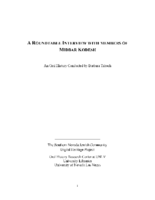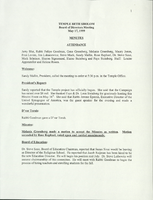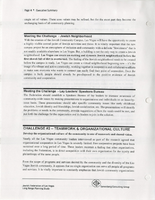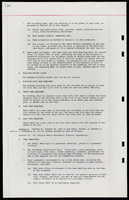Search the Special Collections and Archives Portal
Search Results

Transcript of roundtable interview with members of Midbar Kodesh, April 19, 2015
Date
Archival Collection
Description
In this interview, members of Midbar Kodesh discuss how they each became involved in the synagogue, and how the congregation formed in the mid-1990s. Some of the narrators grew up in Las Vegas and talk about the growth of the town and being former members of Temple Beth Sholom.
Text

Jewish Federation correspondence, meeting minutes, and other records, item 11
Description
Community Relations Committee meeting minutes for the Jewish Federation of Las Vegas, Nevada, February 24, 1988.
Hillel Jewish Student Center at UNLV
Hillel at the University of Nevada, Las Vegas (UNLV) was founded in 1976 by Roberta Sabbath. Jewish Federation director Jerry Countess encouraged Sabbath to start a Hillel group and provided funding of $3,000 for the first year. Hillel is a national organization that engages Jewish students on university campuses and encourages them to stay involved in Judaism. It provides activities, a way for Jewish students to network, and an on-campus Jewish community. Hillel's programming includes social and holiday events, educational speakers, and Shabbat services and dinners.
Corporate Body

Minutes from Temple Beth Sholom Board of Directors meetings, January 1999 - June 1999
Date
Archival Collection
Description
Meeting minutes include reports from committees of the board, correspondence, and balance sheets.
Text

Jewish Federation of Las Vegas long-range planning study, 2000
Date
Archival Collection
Description
Long-range planning study conducted and prepared by the Levenberg Consulting Group regarding the Jewish community of Las Vegas with particular attention to Jewish elderly, the economically disadvantaged, young adults, and Jewish education at all ages.
Text

June Monroe and Kazuko Atomura oral history interview: transcripts
Date
Archival Collection
Description
Oral history interviews with June Monroe and Kazuko Atomura conducted by Cecilia Winchell and Stefani Evans on July 14 and July 19, 2022 for Reflections: the Las Vegas Asian American and Pacific Islander Oral History Project. In the first interview, Kazuko Atomura describes her childhood in Taiwan and Tokyo, Japan, and shares both happy and difficult mememories of that time. Atomura eventually moved to Los Angeles, California, where she reconnected with a man she previously met in Japan. She married him and together had their daughter, June Monroe, and another son while living in Corpus Christi, Texas. After difficult medical procedures involving Atomura's husband and Monroe's younger brother, Brian, the family relocated to Las Vegas, Nevada. Monroe recalls attending Las Vegas High School and Bonanza High School, and the struggle of making new friends as a young person. In the second interview, the mother and daughter discuss racism, discrimination, and identity. Kazuko Atomura recalls her many experiences with discrimination as a result of both her appearance and language barriers. June Monroe discusses how she came to be proud of her Japanese heritage, while Atomura discusses some of the community activities she has been involved in since living in Las Vegas including the Japanese Culture Club and odori dancing. Then, both Atomura and Monroe discuss Monroe's brother, Brian, who received two kidney transplants; one from Monroe's father and one from Monroe herself. Atomura talks about the shrines she has built for Brian, the experience of him being on dialysis, care taking, and his final days. Monroe shares about her activism with organ donation, being regularly involved with the Nevada Donor Network and helping to pass significant pieces of legislation within the area of organ donation.
Text
Emily Persaud-Zamora oral history interview
Identifier
Abstract
Oral history interview with Emily Persaud-Zamora conducted by Cecilia Winchell and Stefani Evans on January 17, 2023 for the Reflections: the Las Vegas Asian American and Pacific Islander Oral History Project. In this interview, Persaud-Zamora remembers growing up in Queens, New York and being exposed to numerous cultures and ethnicities. Though her parents separated when she was two, Persaud-Zamora maintained a steady relationship with both. Her mother was originally from Brazil and worked as a chef, primarily for private homes. Her father was an immigrant from Guyana, with roots in India, and did catering for large events and eventually moved to Georgia. Growing up she recalls being between two worlds, never feeling quite Brazilian enough or Asian enough, but still being connected to her Hindu roots in various ways. When she was fifteen, Persaud-Zamora and her mother moved to Las Vegas, Nevada, where she continued high school and describes the cultural differences between the two places she had lived. After high school, she received a degree in political science and ended up working in public policy. Her current position at Silver State Voices involves work with many different organizations across Nevada to advocate for progressive issues and underrepresented communities. Throughout the interview, Persaud-Zamora touches on a number of other issues, including her religion, traditions, and family.
Archival Collection


